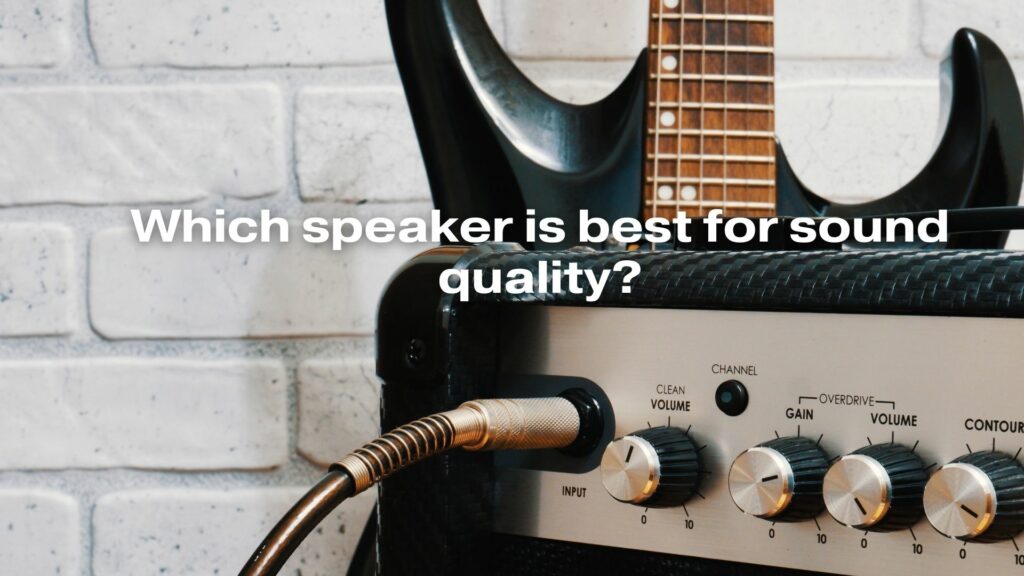When it comes to choosing the best speaker for superior sound quality, audiophiles and music enthusiasts are faced with a plethora of options. The pursuit of the perfect sound experience can be a deeply personal one, as sound preferences vary from person to person. In this article, we’ll explore the key factors that determine sound quality in speakers and examine different types of speakers that are known for delivering exceptional audio performance.
Factors Influencing Sound Quality
Several factors contribute to the overall sound quality of a speaker. To determine the best speaker for your specific needs, it’s essential to consider these elements:
- Speaker Design: The design of the speaker, including the shape and size of the cabinet, the arrangement of drivers (woofers, tweeters, and midrange), and the use of acoustic technologies, plays a significant role in sound quality.
- Driver Quality: The quality and construction of the drivers (the individual components that produce sound) greatly influence sound performance. High-quality materials and precision engineering can make a substantial difference.
- Crossover Design: A well-designed crossover network that routes different frequencies to the appropriate drivers ensures a balanced and accurate sound output.
- Speaker Enclosure: The type of speaker enclosure, such as ported (bass reflex) or sealed, can impact bass response, resonance, and sound clarity.
- Acoustic Environment: The room or space where the speakers are placed plays a crucial role in sound quality. Acoustic treatments, room size, and speaker placement can all affect the overall listening experience.
- Amplification: The power and quality of the amplifier or receiver driving the speakers can significantly influence sound quality. Choosing the right amplifier to match the speaker’s requirements is vital.
- Source Material: The quality of the audio source, whether it’s vinyl records, high-resolution audio files, or streaming services, can influence the perceived sound quality.
Types of Speakers Known for Sound Quality
Several types of speakers are renowned for delivering exceptional sound quality. While the “best” speaker ultimately depends on individual preferences and specific use cases, here are some categories of speakers that are known for their sound excellence:
- Floorstanding Speakers: Floorstanding speakers, often referred to as tower speakers, are large, freestanding speakers that provide a full-range sound. They are prized for their ability to reproduce deep bass and clear highs, making them an excellent choice for music and home theater systems.
- Bookshelf Speakers: Bookshelf speakers are compact and versatile, ideal for smaller spaces or as part of a surround sound system. Despite their size, many bookshelf speakers offer impressive sound quality, with precise imaging and clarity.
- Studio Monitors: Studio monitors are designed for accurate and uncolored sound reproduction. They are favored by recording engineers, producers, and musicians for critical listening and mixing.
- High-End Audio Speakers: High-end audio speakers are known for their meticulous design, exceptional build quality, and uncompromising sound performance. These speakers often feature custom drivers and proprietary technologies to deliver pristine audio.
- Electrostatic Speakers: Electrostatic speakers use a thin diaphragm between two perforated panels to create sound. They are celebrated for their transparency, precision, and lack of distortion, making them a favorite among audiophiles.
- Horn Speakers: Horn speakers are recognized for their efficiency and dynamic range. They are commonly used in high-end audio setups and live sound reinforcement applications.
Conclusion
Selecting the best speaker for sound quality involves a blend of subjective listening preferences, the intended use of the speaker, and an understanding of the key factors that influence sound performance. It’s important to consider factors such as design, driver quality, room acoustics, and amplifier matching when making your choice. Ultimately, the “best” speaker will be the one that delivers the sound quality that resonates with your personal listening experience and meets your specific audio requirements.


